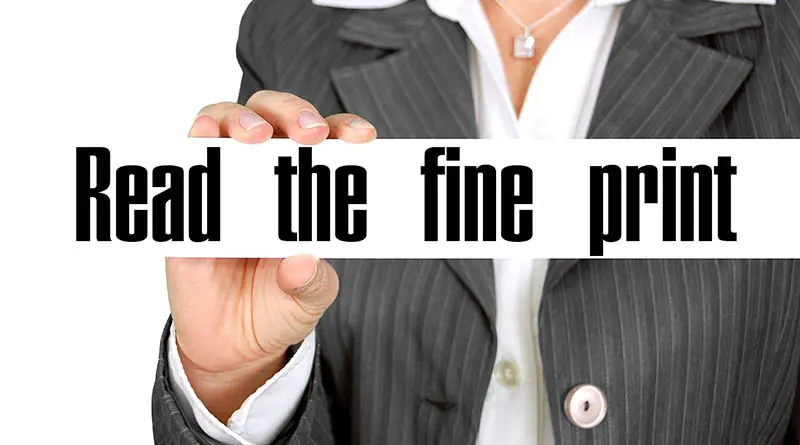Can we talk about contract traps for a minute? You know, those little clauses lawyers like to throw into the terms and conditions, end-user license agreements and contracts of carriage that apply to everything we do.
Those contract traps, yeah.
It happened to me. My kids signed up for a one-year student account for Adobe Creative Cloud. The agreement had a common but often overlooked clause: It self-renewed at the end of the year. And unless you showed Adobe that you still qualified for the student price, you’d pay full price.
Surprise!
So when I found a $359 charge on my credit card bill, I was clueless. How clueless? I didn’t even know we had an Adobe account — that’s how clueless. (Word to the parents — don’t hand your credit card to your kids. Ever!)
Surprises like this happen every minute of every day. Consumers discover they don’t have a right to a refund. They learn they can’t sue the company if something goes wrong. Why? They signed those rights away when they bought the product or service. Often, they didn’t even know it.
Companies hide these consumer-unfriendly provisions, often in plain view. They render them in the fine print, translate them into legalese, or bury them deep within their sites. I consider that hiding, although the lawyers who do it probably call it something else. They would say it’s perfectly legal.
Ridiculous terms no one would agree to
These “gotchas” were slipped into your agreements. They limit your ability to get a refund, of an exchange, and sometimes force you into a future purchase (an “opt-out” requirement). On my consumer advocacy site, the worst offenders are airlines, but out in the real world, cable companies, wireless companies, and payday lenders also get a fair amount of attention. A good lawyer can help you avoid them, but who has the time and money to run every purchase past an attorney?
Provisions that limit damages
You may fall into one of the contract traps by signing away your ability to collect damages. “In the end, your ultimate guarantee that a company will provide the goods or services it promises to provide is your ability to recover damages if it doesn’t,” says Tom Simeone of the Washington, D.C. law firm Simeone & Miller. “If a contract limits the damages you can recover, you have little recourse to the law and, in turn, the company has little incentive to fulfill its obligations under the contract.”
Forced arbitration clauses
Such clauses eliminate the consumer’s right to bring a claim for damages in favor of submitting any disputes that arise to an independent arbitrator. Some clauses specify who the arbitrator is, while others provide a panel from which to choose. “Your lawyer may be limited to taking one or two depositions in a case where he really needs to take several just to determine who the right party to depose is,” says Paul Cannon, an attorney with the law firm Simmons and Fletcher, P.C. “Having your case forced into arbitration often makes it very difficult for your lawyer to do his job. This is just one more way the companies give themselves an advantage in defending claims.”
Waiver and indemnity agreements
These contract traps can be found in trampoline parks, rock climbing sports and bounce house businesses. The waivers say that a person participating in the activity releases the company in the case of negligence and often gross negligence. Meaning that if they never inspect the 15-year-old trampoline and your child breaks through the worn fabric and crashes onto the concrete below, sustaining serious injuries or death, the company is off the hook. As a scuba diving instructor, my employer required everyone to sign an agreement with an indemnity agreement. The way I understood it, all of my students could drown and the dive boat operator to walk away free.
Warranties that cover the company but not you
Don’t believe this is one of the biggest contract traps? Then check out our warranty horror stories. “Consumers have to read and understand the warranty,” says Derek Hales, a home warranty expert who edits the site Moderncastle.com. “This applies to virtually every industry.” What are the main warranty “gotchas”? Violating the warranty — like breaking a seal on your electronics — limitations that cover only certain parts, time limits on certain parts, and warranties that void with usage. In other words, read that warranty very, very carefully. (Related: Why is the Food Network Magazine harassing this lady?)
Consumers are fighting back against contract traps. Take the forced arbitration clauses, which also limit your ability to participate in a class-action lawsuit. Thanks to crowdsourcing, consumers have found a creative way around that, says Jen Cornell of the Minneapolis law firm Nilan Johnson Lewis P.A. They’ve successfully used crowdsourcing to gather thousands of arbitration claims online — and retaliate. “What was once a cost-effective move could backfire if a company is targeted through a crowdsourced effort,” says Cornell. “Essentially that could lead to death by a thousand cuts.” (Here’s how to fix your own consumer problems.)
And you’re probably wondering how my Adobe case ended. I spent about an hour in an online chat with several representatives, explaining that we hadn’t logged into our Creative Cloud account for months. At first, they wanted to make me a special offer of three “free” months. When I declined, they tried to charge a 50 percent cancellation fee.
I asked the rep to consider a refund “in the interests of good customer service” and was pleasantly surprised when he said “yes.”
Lesson learned? Next time, I’ll make the purchase myself. Credit cards + kids = bad idea.




